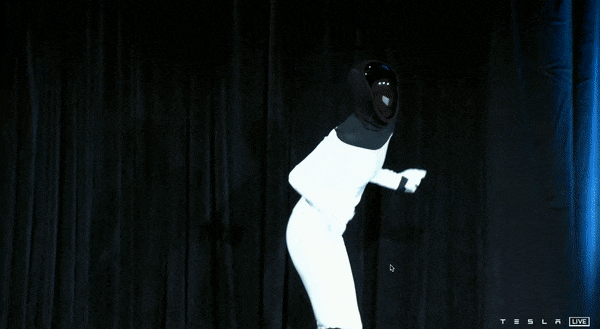Musk, the richest man in the world, has a rich imagination. His star chain plan and tunnel engineering have indeed made substantial progress. He helps people "think out of box" with various behaviors and speeches. His unique style makes people full of tolerance for his bold predictions, and no one really investigates them even if they are inconsistent with reality. Recently, foreign media reviewed Musk's seven "surreal" predictions.
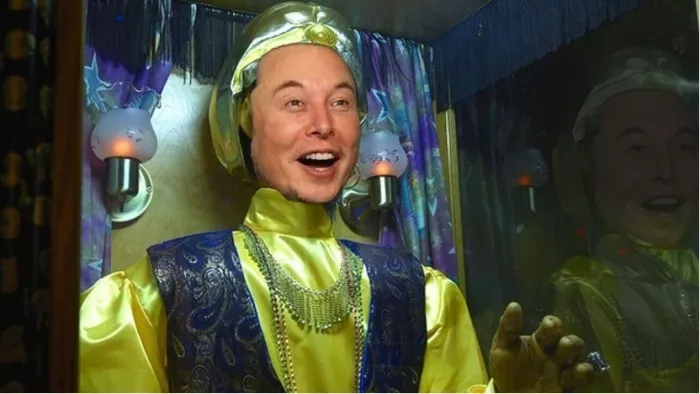
Here is a summary of Musk's seven "surreal" predictions.
Prediction 1: Tesla will realize fully automatic driving "next year"
Reality: next year has not come
Summary of Musk's speeches from 2014-2021 (01:15)
In 2014, musk said Tesla would realize automatic driving "next year".
By 2021, even Musk's own engineers will not believe it. According to the comments leaked by CJ Moore, head of Tesla autopilot software, the next web, L5 level automatic driving is still far away.
"Elon's statement is inconsistent with CJ's engineering reality," the California motor vehicle department said of a phone call with Tesla staff. "Tesla is currently at L2 level."
But this feedback did not weaken Musk's optimism. In January this year, he predicted for the ninth consecutive year that full self-driving (FSD) would come out within 12 months.
Forecast 2: 1 million Tesla self driving taxis will be on the road by 2020
Reality: there will be 0 Tesla self driving taxis on the road in 2022
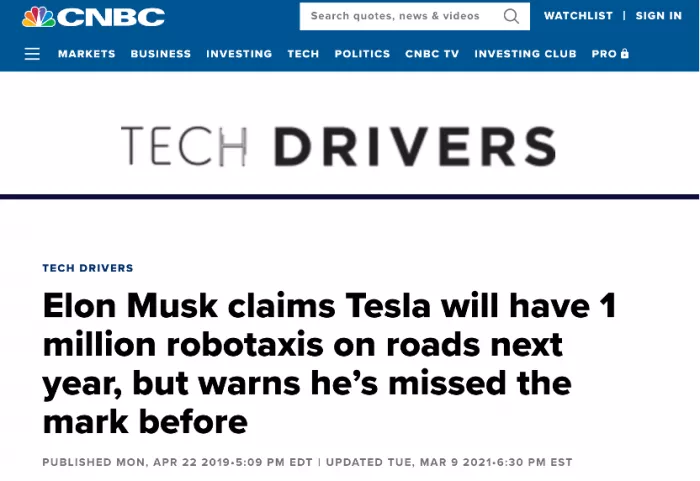
The promise of fully automatic driving (FSD) is clearly not bold enough. In 2019, musk made a bolder prediction for autonomous vehicle: Tesla will have 1million "robotaxis" on the road in 2020.
"I'm very confident in Tesla's prediction of autonomous taxis next year," said in Musk on Tesla independent investor day. They won't "exist in all jurisdictions because we won't get regulatory approval anywhere. But I believe in fact, we will get regulatory approval at least somewhere next year."
Musk envisions Tesla owners renting their cars, Tesla taking a share of the revenue, and FSD vehicles will compete with online car Hailing giants such as Uber and LYFT.
Two years after his deadline, no cars have arrived - but musk is still optimistic.
At Tesla's earnings conference call in the first quarter of this year, musk said that self driving taxis without steering wheel or pedal will start mass production in 2024.
Forecast 3: by the end of April 2020, there will be almost no new covid cases in the United States
Reality: by the end of April 2020, there will be more than 20000 cases per day
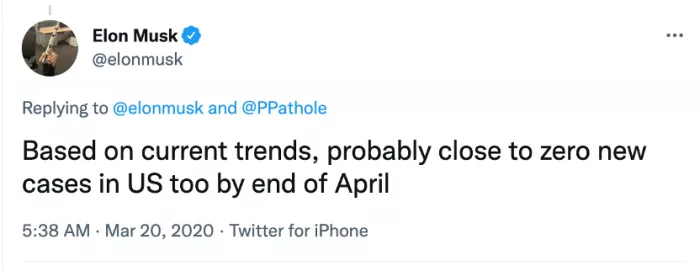
In March 2020, a few days after who announced the global pandemic of covid-19, musk predicted that by the end of April, the United States "may have nearly zero new cases".
However, when his deadline came, the number of new cases per day had exceeded 20000. Nearly two years later, the United States reported a record 1.35 million new infections a day. Musk has always played down the danger of novel coronavirus and the need for restrictions - especially when these restrictions affect Tesla's operations.
If company employees feel unsafe in the factory, he does generously allow them to stay at home. In an email sent to the company's factory workers in early May 2020, he wrote that if "you feel uncomfortable returning to work at this time, please don't feel obliged to do so".
But then it was reported that he fired those who failed to rework. Two Tesla workers said that when the factory resumed production in the second week of May that year, they chose to take unpaid leave to protect themselves and their families, and received notice of employment, saying that they "could not return to work".
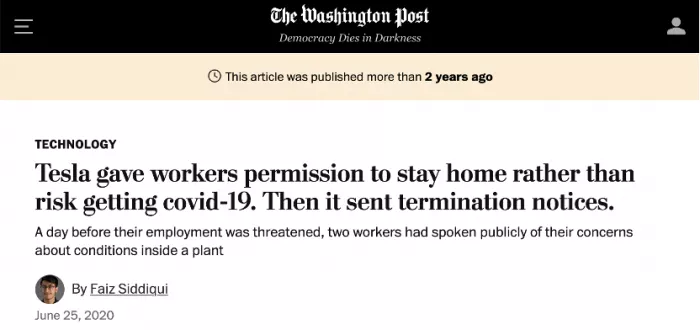
Prediction 4: neuralink will enter the human brain in 2020
Reality: neuralink has not yet started human trials
Musk's brain computer interface startup neuralink is developing a chip that connects the brain to the computer. Musk predicts that the technology will be implanted into the human brain by 2020.
This hasn't happened yet, but neuralink has indeed put the chip into the macaque. The monkey can use his brain to play table tennis in exchange for a banana reward.
However, some scientists pointed out that Musk's neuralink is not the first time in the world to let monkeys control computers with their minds. In fact, monkeys have been playing video games with their brains for nearly 20 years. "It's not new for monkeys to use their brains to control computer cursors," Andrew Jackson, a professor at Newcastle University, said in an interview with insider. Technology demonstrations like neuralink first took place in 2002.
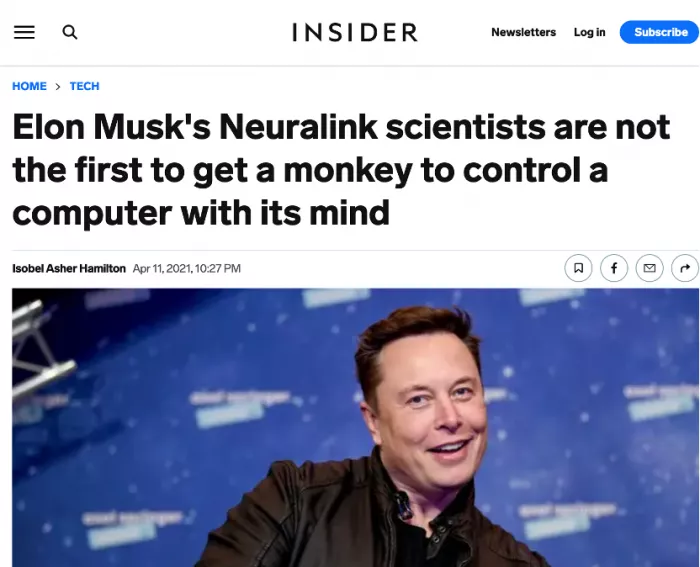
Nevertheless, through Musk's dissemination, people are still impressed by neuralink's demonstration.
At the same time, musk revised his human test objectives. In January, he postponed it to his favorite deadline - next year.
Prediction 5: neuralink will "solve" autism
Reality: autism is not a disease
Neuralink's most glorious primary goal is to restore the mobility of paraplegic patients, but this is only the beginning. Musk hopes that these chips can also treat neurological diseases, realize telepathy, and ensure that humans thrive with super intelligent machines.
"So I think neuralink will solve many brain related diseases at the beginning. It can be anything, such as autism, schizophrenia and memory loss." His prediction caused an uproar. Critics point out that autism is not a disease that cannot be "solved" and should not be regarded as a defect.
Later, musk publicly discussed his autism experience in his Ted speech (Elon Musk talks, twitter, Tesla and how his brain works), which to some extent relieved some negative impressions around the disease.
So far, neuralink's technology is closer to the Bluetooth actuator that operates brain signals. In essence, it reminds people of "connection". How this translates into "solving" or "curing" autism and other mental conditions remains a complete mystery. At present, the technology of using brain implants to treat Alzheimer's disease and other diseases depends on controlled electrical stimulation, which has nothing to do with the man-machine interface.
Forecast 6: 1 million people will live on Mars by 2050
Reality: it depends on the number of people who die during the journey
While not busy innovating transportation, integrating people with artificial intelligence and doing stand up comedy (musk hosted the American comedy variety "Saturday night live" for the first time last year), musk is trying to make mankind a multi planetary species.
Musk, the founder of SpaceX, chose Mars as our next home. He believes that 1 million people will live on this red planet by 2050.
The elliptical orbit of earth and Mars means that the shortest distance between planets is about 55 million kilometers and the longest distance is more than 400 million kilometers. Musk plans to launch his rocket during a short window in orbit that is conducive to travel, but this happens only once every 26 months.
Joseph pesenti, founder of YouTube channel real life lor, estimates that the plan will require 100000 trips and trillions of dollars from the Starship spacecraft.
Musk said the colonists would receive travel loans. Work on Mars can help them repay the money. He wrote on twitter that "anyone needs to be able to do whatever they want and provide loans to those who don't have money".
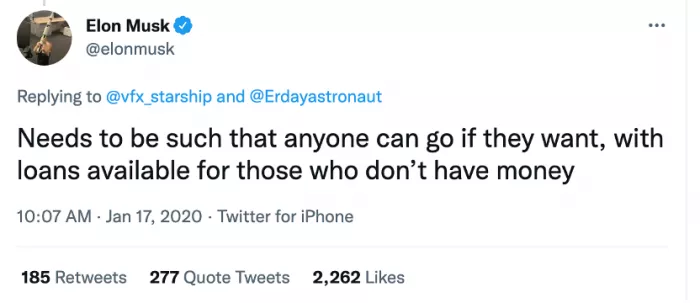
Such a journey takes about seven months, which is longer than the average mission on the international space station. Being in zero gravity for such a long time can lead to countless health problems. Astronauts lose up to 30% of their muscle mass and 1-2% of their bone mineral density.
After two to three months under zero gravity, it takes weeks and months for muscle mass to recover, and it takes up to two years for bone mineral density to recover. On the other hand, the damage to astronauts' cardiovascular system may be irreversible.
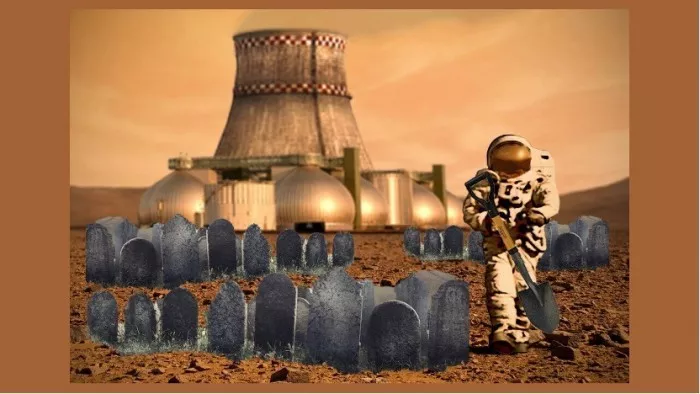
But this estimate is based on the recovery on earth, and the gravity on Mars is one-third of that on earth. Therefore, even if you only spend a weekend on Mars, travelers will spend about 14 months in zero gravity. For those who want to become colonists on Mars, if there is no artificial gravity on Mars, it is difficult to imagine what kind of failures will occur in human digestive system, nervous system and cardiovascular system over time.
And this is only the smallest part of the risk consideration.
Prediction 7: Tesla's robots will be more valuable than its automotive business
Reality: if Tesla auto business doesn't exist
Tesla is famous for its cars, but musk said the "most important product" developed by the company was a robot called Optimus (Optimus Prime). "Those who have insight or listen carefully will understand that Optimus will eventually be more valuable than the automotive business and more valuable than fully automatic driving, which I firmly believe." Musk said in April.
At the opening ceremony of Tesla Texas new super factory in April, musk said, "we have the opportunity and hope to produce the first version of Optimus next year."
At present, the only person wearing tights is the robot.
